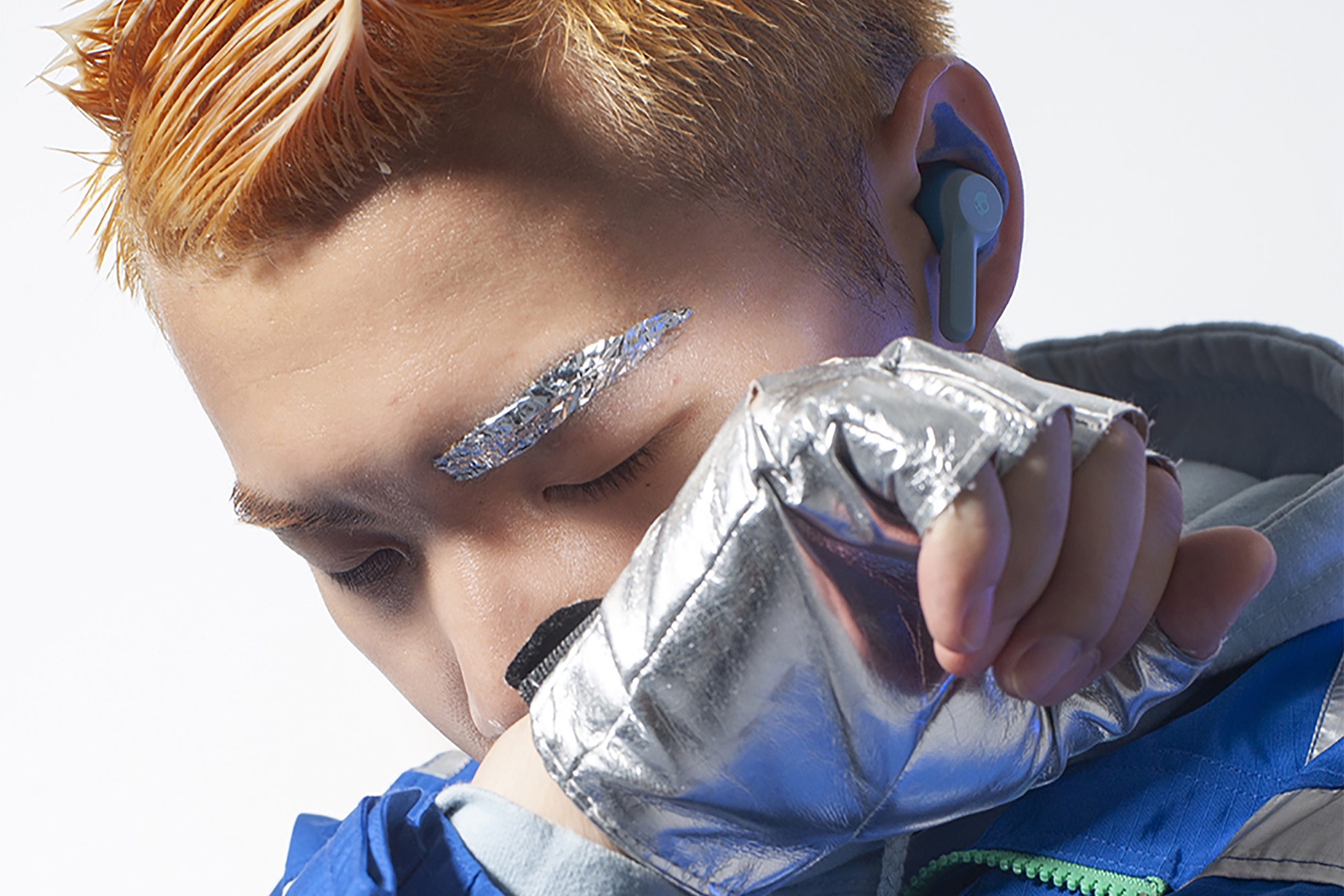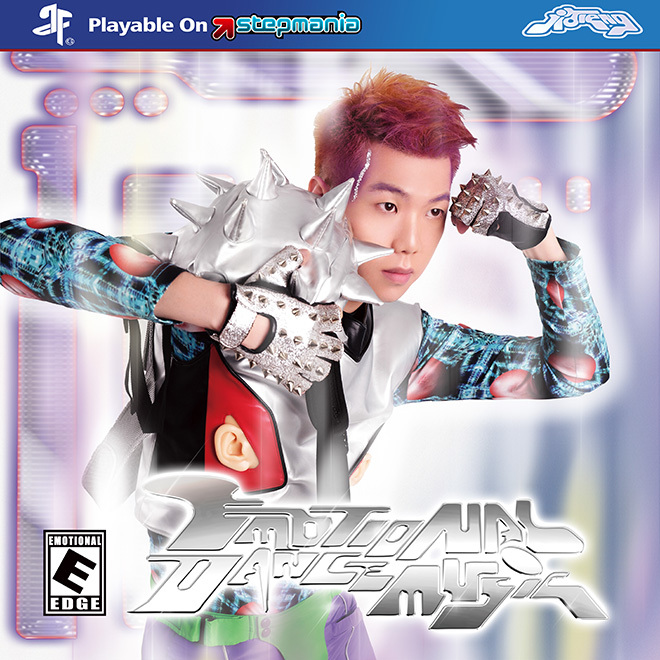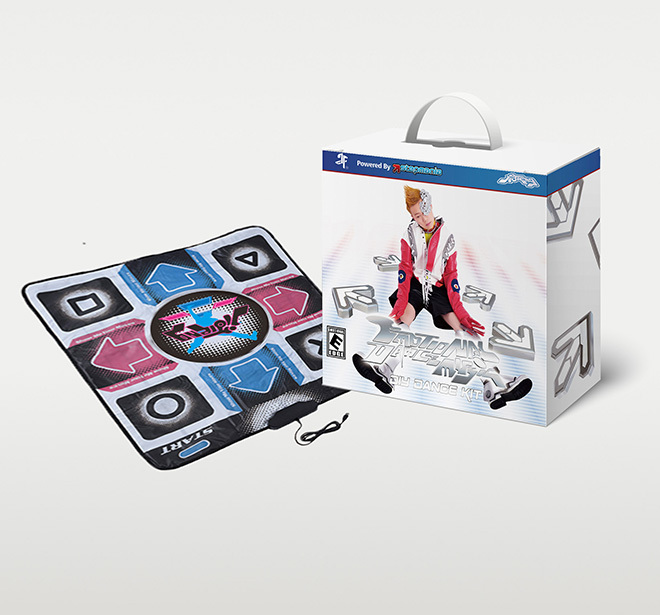 Interviews
Interviews
Chinese hyper-pop artist jiafeng reconstructs the fringes of music & culture into Emotional Dance Music
The project is presented as the second coming of Dance Dance Revolution
EDM. But it's not what you think. Otherwise known as electronic dance music, in this case, it stands for Emotional Dance Music and is also the name of Gao Jiafeng’s latest music-game hybrid release. The ingenious 10-song album was inspired by Dance Dance Revolution video games and is a caffeinated blend of "hyper pop, sugar-coated dance music" and "lighting speed trance-pop". The album’s Chinese title 幻愛鋭舞會 translates to “fantasy-love dance party”, which doesn't quite work in English, yet somehow makes perfect sense once you've digested the album (and this interview) in its entirety.
Hunan-born but Shanghai-based, jiafeng is an artist in every sense. He self-describes his artist project as a "karaoke/alternative pop/comedy project" but after speaking with him at length about the adjacent and collateral histories, communities, cultures and subcultures that have given form to his multi-layered artistic identity, we have decided to insert neo-nostalgic and revolutionary into his self-description.
The aesthetic of 'Emotional Dance Music' is heavily influenced by 2000s internet culture: glitchy, bubbly, shiny, cyborgy and techno-utopia-y. You would never guess that just before jiafeng made the album, he was making improvisational noise music with his saxophone in New York. He's all over the map, figuratively and literally — also playing NTS Radio, Shanghai Fashion Week, Strawberry Music Festival and more, and has done national tours in China, the U.S. and Europe. Why? Because all this noise comes together in perfect syncopated harmony as one of the most riveting (and raucous) musical experiences one could hope for.
We serendipitously stumbled on jiafeng on Instagram, and curious about the trajectory of his musical identity, the noise scene in New York and its hypocrisies — we fired the artist a message. He jumped on a call and he spoke to us while eyeing a heavy Beijing rainfall from his dorm room window, where he is practising for his performance at the first round of Rap of China. The conversation didn't go as planned and we were quickly pulled down the proverbial rabbit hole as the artist gave us a riveting recount of his influences, philosophies of life, art and freedom, his opinions on the differences between living as an artist in America vs. China, throwback culture and more. In contrast to his irreverent and immediate visual presence, he spoke carefully and thoughtfully, choosing his words over the WeChat call with precision, intent and the integrity of a true artist. Introducing the wild and wacky world of jiafeng...
The new album is a motley of style, sound and everything in between. What is your favourite element of the new album?
I’m proud of the album’s balance between retro sounds and the 2020 sound. Everybody likes retro and nostalgic sounds nowadays, but I am not interested in doing completely old school throwback stuff for the sake of remaking it. I’m also really happy that I found Stepmania, an open-source gaming framework that’s a simulation of Dance Dance Revolution. It’s free so you can modify and monetise it. I’m so glad I found this because it allowed me to link all of my ideas together; I was heavily influenced by dance music from the early 2000s, but also emo trap, new wave, avant trance and PC music. Finally, with this dance game, I was able to link all the music, concepts, eras and aesthetics that I liked together.
Every parent has a favourite. What are your favourite from the album?
‘World Class Humble’ and ‘Parinirvana Shoujo’ — it’s hardcore pop but also very trancey. ‘Facetime Love’ is my own story, so it’s personal to me too.


Someone like you doesn't grow up with regular icons. Who are your biggest influences (across all art forms)?
I’m really inspired by this Taiwanese performance artist Tehching Hsieh. His works are all very self-explanatory. For example, he took selfies for one whole year, showing the passage of time. In another year, he documented his life as he lived together with another performance artist Linda Montano and had an eight-foot long rope tying and connecting them together — a hardcore, patient documentation of life. This shocked me because I only ever saw performance art that lasted an hour at most. Other works of art like paintings on canvases or pieces of paper or large spaces were still always confined to a certain time and space, but this guy used his life as his canvas. Very hardcore! I could never do something like that, and it wouldn’t make sense to just copy what he did, but he inspired me to start creating a persona for my artistic self to make my life and my existence a work, a project.
Another artist I’m really inspired by is Taiwanese performance artist-musician Dawang “Yingfan”/“black wolf”. He looks like a random guy from a parking lot performing really bad karaoke. He just uses karaoke backing tracks and does whatever he wants on top of the track, changing lyrics or melodies and making political statements. He’s crazy and brilliant. Most importantly, he’s free when he’s performing. Sometimes he just wears underwear and dances crazily. What inspires me about him is his freedom to be himself. We are not similar in look or style but I think we have the same energy and the same beliefs. Again, he is another hardcore person, but he’s also really deeply knowledgable about a lot of different music genres. He does a lot of music archiving.
Having lived in New York, Hunan and Shanghai, which city in the world do you feel the most yourself?
So far it’s been Shanghai where I’ve felt the most… free. In Hunan where I was born, there’s too much family, and New York was too expensive. Also, people were a bit too… cynical or sarcastic. It’s my favourite and least favourite thing about New York. Maybe it was just my circle but I found it stressful to be myself. Also, I feel more comfortable living in a country that speaks my mother tongue. I can create in my own language without worrying about whether people understood me, whether people would misinterpret me. My lyrics are at the core of my entire creative process. That’s why I couldn’t feel that freedom in New York.
How have you evolved artistically since the beginning of your music career, or from when you were a child?
When I was a kid, I just listened to whatever the world was playing, which was pop. I grew up on pop music. Not rock, not electronic anything, just pop music. That was my biggest influence as a kid. Then I picked up the saxophone, but in China when you learn saxophone (or piano or any instrument for that matter), all you learn is Mozart and some traditional Chinese scores. No jazz. I asked my teacher to teach me jazz, and he said, “You wouldn’t understand”.
I got into rock music in middle school, formed my own band and tried so hard to learn guitar on a cheap guitar. I got a pirated version of Cakewalk and that was my segway into music production. There was a big pirate CD market in my city, and my mum would get discs from there. I had an electronic keyboard with MIDI input, and so I started making stuff out of curiosity. I was 14 then, and I would just skip lunch, rush home after school, and record guitar into Cakewalk. Everyone was playing Counterstrike and I was just trying to make stuff. IDM (intellectual dance music) was really popular then, and hip-hop too. North European stuff too. Glitchy, tiny, shiny, bright sounds. I was really into that kind of stuff, so I started to make electronica like that. At the same time, I was in a post-rock band with a couple of older guys. I eventually quit because the band was taking too much of my time, and they weren’t efficient at all. They had the best gear and were paying almost nothing for rent, but all they did was smoke and eat. So I thought, why not make my own music and be the god of my own world?
I made friends with these people that were really into experimental music. I felt excluded and awkward at first, but because of that, I saw it as a challenge. I made it a task to figure out how to make experimental music. I joined a loose improv-based reggae band. Then I moved to New York, which had a big noise/improv scene. I dived in headfirst. My few years in America was like an experiment: I became more social and was really integrated in the music scene there. I made friends with other artists and collaborated with and lived with them. New York is a place with a magical acceleration of ideas.
The noise music scene in New York was very mind-intensive; it emphasized ideas and concepts over aesthetic beauty. I got bored with that really quickly. Noise music in the 60s and 70s was about change and revolution; it was born to break walls in music. It pushed musical and social boundaries. It said, “not only upper-class intellectuals can play music”. It was about freedom. It was anti-elitism. But now, noise artists in New York are just doing the same thing they’ve been doing for decades. It has become restrictive, inaccessible and elite again.
.jpg)
What was the artistic environment at New York University like? Did you find it forward-thinking?
A lot of musicians that were pushing boundaries in the 70s, 80s have become professors at music schools, telling their students to sound a certain way based on the history of music. But I think young people should focus on what they like, not what their professors like. They should focus on their own history — not the singular linear history from a music textbook — but their own history of influences, their own browser history. We should be taking advantage of our technology and exploring as much as possible. History isn’t a flat line of archives anymore, so as artists we should be adapting to that. We don’t live in a vacuum; we can access information about the 1900s just as easily as the 80s. Music is not a science. It shouldn’t be built upon research.
How did you go back to pop music from noise music when you got sick of the noise scene in New York?
Let me go back to the previous question. So I got tired of the experimental music scene that emphasized harsh atonal sounds, which were traditions of that genre. In response, I tried to play similar stuff on the saxophone, but on top of the music I started to add words and also really sweet, smooth, corny pop melodies. If “all sounds are equal” is your mantra, then pop should be one of the sounds. I started to do a lot of story-telling in my shows, and made a lot of people laugh, as if it were a stand-up show. That’s when I decided what to do next in my artist career — use words.
I found that our brains cannot process two songs in different keys and with BPMs at the same time, or two separate conversations. But we can process a conversation on top of music — they affect each other chemically. I was really into this idea until I realised it was just plain songwriting, the most basic art form. That’s when I went back to the basics of artist expression — the song.
It feels like I was on this island when I was a kid, then discovered that the world was massive, then travelled the world (of rock, post-rock, electronic, noise, experimental) only to return to where I first came from.
.jpg)
What do you think of the state of the electronic music scene in China right now?
The electronic music scene in China is starting to split into different paths. Ten years ago, electronic music was one cohesive thing. Everybody who listened to techno also listened to hip-hop, trip-hop and techno. All this music that wasn’t just pop ballads only started flooding in not long ago. It’s starting to divide because people in their 40s are still going to techno shows that sound like 2009, or hardcore Beijing hip-hop shows. People’s tastes are getting more stabilised. In the early years, all clubs had the responsibility of being diverse. But now each club is more specialized.
Shanghai is really interesting, because you can find any subculture in the world there. Grime is there, gabber is there, and gabber has been dead for a long time, or so you’d think. People in Shanghai are dancing to high speed techno mixed with Japanese hardcore manga. Flamenco, swing dancing — there are communities for every subculture.
Are there other young artists that you’d like to work with, or that you are excited about?
I’m really excited about PC music in the UK — they’re doing such a great job infiltrating the pop world. Bedroom producers with their super glamorous, sarcastic, twisted aesthetics are infiltrating the entire pop world. I really respect that. There’s this producer Felicita that I worked with on the new album who’s from the UK and has worked with Sophie and Palmistry. There’s this American artist Slayyyter who sings almost exactly like Britney Spears but her production is more contemporary and edgy. There’s Ayesha Erotica who makes sparkly pop with super dirty lyrics. The contrast is amazing. This person also just quit the music world entirely somehow. Not sure how or why or when, but you can’t find them on Spotify or anywhere. They’ve just disappeared. Oh, and there’s this really popular Japanese band Wednesday Campanella, a three-piece formed by a music producer, a film-maker and a performer. Only the performer shows up on stage so everyone thinks she’s Wednesday Campanella. The structure of the band is just genius. They can do everything so efficiently. That has really inspired me when I first started making pop.
Where do you see yourself heading next, artistically? Is the retro sound just for this album?
To me, retro is a verb. It is not really a fixed aesthetic. It’s just a thing that I’ve decided to do. I make retro influenced music, but I am not trying to remake the 2000s. I’m still trying to be relevant to today. I’m probably not going to stop the glitchy internet aesthetic, but I’m also not going to stop experimenting and exploring contemporary sounds. I have a lot of doubts about the future — what will people be ‘retro’-ing about in five years? The half-life of the retro trend is getting smaller and smaller. 2000s retro is huge now, and is about to influence every aspect of pop culture. People were throwing back to the 80s in 2015, the 90s in 2018 and the 2000s in 2020. I did the math: in mid-2050 people will be retro-ing January 2050.
One thing that’s really interesting to me is when I see some kid born after 2000, wearing Metallica shirts or random clothes from another era without knowing who/what bands they are. I think it’s great that it costs nothing to access the past now. Until now, we were doing “linear retro”. We’re gonna get to a point where retro will be pulled from a multi-dimensional history. Soon there will be a mash-up of 20s and 80s aesthetics. That’s gonna be so fun and interesting. I really admire people who don’t give a shit about what makes sense historically or traditionally.
Watch a (satirical) preview of the album below:
Jiafeng’s 'Emotional Dance Music' album is out now on all streaming services. You can follow him on Instagram here.


